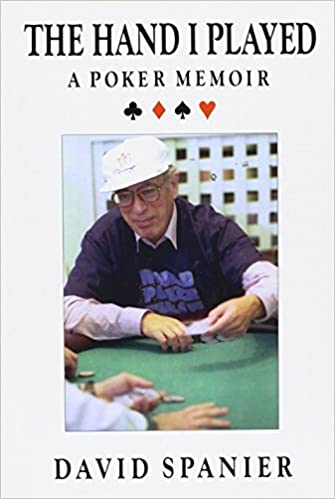Background
David Spanier was born on 30th April, 1932 in Hamstead, north London, United Kingdom. The son of a stockjobber, Spanier grew up among a prosperous liberal Jewish family.

David Spanier working at the Times
David Spanier playing poker
David Spanier playing chess
Charterhouse Square, London, EC1M 6AN, England, United Kingdom
Spanier was educated at Charterhouse.
Trinity Street, Cambridge, England, United Kingdom
David studied journalism at Trinity College, University of Cambridge.
28 St John's Wood Rd, St John's Wood, London NW8 7HA, United Kingdom
Spanier was a former council member of the Liberal Jewish Synagogue.











(European Economic Community - Great Britain. European Eco...)
European Economic Community - Great Britain. European Economic Community - Studies. European Economic Community - Entry of Great Britain. International relations. Foreign policy. International trade.
https://www.amazon.com/Europe-Our-David-Spanier/dp/0436478854/ref=sr_1_29?dchild=1&keywords=spanier+david&qid=1586764631&sr=8-29
1972

(Winning at poker is not just analysis, clever tactics, no...)
Winning at poker is not just analysis, clever tactics, nor even inspired bluff—although Total Poker examines all these in depth. Ultimately, luck works out the same for everyone—there really is no such thing as “good cards” or “bad cards.” As the author maintains, winning is a “psychological decision” made by each player. Packed with stories about the application of poker to life in general, Total Poker looks at the game’s history, culture, techniques, strategies, rules, and probabilities.
https://www.amazon.com/Total-Poker-High-Stakes/dp/1843440067/ref=sr_1_1?dchild=1&keywords=spanier+david&qid=1586763903&sr=8-1
1977

(This little book is a must for anyone who wants to know t...)
This little book is a must for anyone who wants to know the basics behind most games found in a casino.
https://www.amazon.com/Pocket-Guide-Gambling-David-Spanier/dp/0855332662/ref=sr_1_15?dchild=1&keywords=spanier+david&qid=1586763903&sr=8-15
1980

(Easy Money is easy reading. Spanier brings his book to li...)
Easy Money is easy reading. Spanier brings his book to life by concentrating on the human side of gambling rather than the theoretical. He discusses Freud's analysis of the compulsive gambler, yet his emphasis is on individuals: a mathematician who devised a way to beat the house advantage at blackjack; a London man-about-town who ran games for the upper class; the cleric who founded the British Gamblers Anonymous; the physician who established a "gamblers' hospital" in Brecksville, Ohio. Spanier considers the motivations of gamesters, stressing the physical sensations they experience, the percentages and chances, heuristic principles, the differences in European and American gambling, and the criminal element in U.S. gaming. But, however well done, this British import is overpriced.
https://www.amazon.com/Easy-Money-Inside-Gamblers-Mind/dp/0436478889/ref=sr_1_8?dchild=1&keywords=spanier+david&qid=1586763903&sr=8-8
1988

(Briefly traces the history of Las Vegas, describes the pe...)
Briefly traces the history of Las Vegas, describes the people who work and gamble there, and looks at the casinos and how they are run.
https://www.amazon.com/Welcome-Pleasuredome-Inside-Gambling-Studies/dp/0874172136/ref=sr_1_6?dchild=1&keywords=spanier+david&qid=1586763903&sr=8-6
1992

(Inside the Gambler's Mind is a thoughtful overview of the...)
Inside the Gambler's Mind is a thoughtful overview of the various facets of gambling that are important to understand in order to appreciate the implications of the current proliferation of gambling in North America and abroad. Spanier includes pithy anecdotes from both sides of the Atlantic that explain the transformation of gambling from an illegal activity to a legal one. Spanier explores the experience of gambling from the viewpoint of a number of intriguing people: from the statistician who developed a system for beating blackjack dealers, to the aristocratic European gambler who liberalized British gaming law, and from the minister who founded Gamblers' Anonymous to the psychologist who pioneered problem gambling treatment programs. Inside the Gambler's Mind, originally published in 1987, pulls together loose threads in the world of gambling - including perspectives of gamblers, casino operators, academic researchers, and regulators - and provides a colorful look at the thrills, the action, and the intense emotional involvement that make up gambling.
https://www.amazon.com/Inside-Gamblers-Mind-Gambling-Studies/dp/087417242X/ref=sr_1_22?dchild=1&keywords=spanier+david&qid=1586766553&sr=8-22
1994

(This outstanding selection of writings from the first reg...)
This outstanding selection of writings from the first regular poker column in a daily newspaper anywhere in the world traverses the poker universe, with stories about poker's games, names, and claims to fame. You'll visit the world's greatest poker venues, feel the emotions of the annual World Series, and relive some of the greatest hands ever played. Packed with information about the popular games--hold 'em, stud, Omaha, and high-low--The Little Book of Poker can improve your play whether you're an absolute beginner or a seasonal expert. You'll learn how to bet, when to bluff, when to drop, and when to pick up your chips and head for home.
https://www.amazon.com/Little-Book-Poker-David-Spanier/dp/0929712978/ref=sr_1_19?dchild=1&keywords=spanier+david&qid=1586764631&sr=8-19
1998

(An outstanding autobiography of the well-known journalist...)
An outstanding autobiography of the well-known journalist, David Spanier, who died in April 2000. Perhaps best known for his regular weekly poker column in The Independent, Spanier was also the author of several books on poker and an avid player of the game. A wonderful mix of straight autobiography refracted through the author's lifelong love of the game of poker.
https://www.amazon.com/Hand-Played-Poker-Memoir/dp/1842430068/ref=sr_1_25?dchild=1&keywords=spanier+david&qid=1586764631&sr=8-25
2000
broadcaster gambler journalist author
David Spanier was born on 30th April, 1932 in Hamstead, north London, United Kingdom. The son of a stockjobber, Spanier grew up among a prosperous liberal Jewish family.
David Spanier was firstly educated at Charterhouse School, London.
After national service in the army, which he loathed, went up to Trinity College, Cambridge, where he studied under Frank Raymond Leavis and played a little unserious cricket.
David acquired some work experience with the Yorkshire Post, and it was there where he started his work after completing his degree at Cambridge.
In 1957, he moved to the Times, where he was to remain for the next 25 years. After four years, he transferred to the foreign department as commonwealth correspondent, and he remained an international expert, except for a brief interval as assistant city editor. Some friends believe he was disappointed not to become deputy city editor, with the possibility of preferment to the top job. Spanier was a journalist who covered diplomacy issues for the London Times from 1973 to 1982.
Unlike many of his colleagues, Spanier did not leave immediately after the Murdoch takeover of the Times. But, in early 1982, he took a job as diplomatic correspondent for the London-based news radio station LBC (London Broadcasting Company) and Independent Radio News.
Later, Spanier became chess correspondent of the short-lived newspaper Today, and then of the Daily Telegraph.
In 1997 he started a weekly column in the Independent.
The Spanier's final article appeared in the Financial Times soon after his sudden death.
(Inside the Gambler's Mind is a thoughtful overview of the...)
1994(This outstanding selection of writings from the first reg...)
1998(Briefly traces the history of Las Vegas, describes the pe...)
1992(Winning at poker is not just analysis, clever tactics, no...)
1977(This little book is a must for anyone who wants to know t...)
1980(An outstanding autobiography of the well-known journalist...)
2000(European Economic Community - Great Britain. European Eco...)
1972(Easy Money is easy reading. Spanier brings his book to li...)
1988Though David Spanier was not especially religious, his choice of the names of his sons (Gideon, Joshua and Samson) reflected his deep pride in being Jewish.
Spanier kept his feelings to himself. He was, in general, a tolerant and self-possessed man, whose favourite way of making a point was with dry wit. David hid an exceedingly sharp mind behind horn-rimmed spectacles and a jaunty, self-deprecating and friendly manner. He described himself as a good European, but his worldly-wise intelligence and his preference for reporting, as opposed to advocacy, kept him a sceptical one. David was extremely fond off gambling. To the end of his life, he gambled heavily, regularly - and, on the whole, successfully. He had a gaming room installed in his home, where he sometimes played poker all night with fellow devotees. His poker, on the other hand, was, from the start, deadly serious. He joked about how in one game he came close to losing his allowance for the whole term; at the time, it can hardly have been very funny.
It was at the Times that Spanier met the distinguished award-winning fashion journalist and author Suzy Peta Menkes, and they married in 1969. Their marriage was exceptionally loving and strong, and David did a great deal to make Suzy's career flourish. They had three sons, Gideon, Joshua and Samson, as well as a daughter, Jessica, who died in infancy.

Suzy Menkes, a British journalist, a fashion critic and an author. She is also the currently International Editor for twenty one International Editions of Vogue.

Gideon Spanier is now the new Editor-in-chief of Campaign magazine.


Samson Spanier is a litigation and dispute resolution lawyer based in London. Samson's practice focuses on all aspects of banking and finance disputes, in particular concerning derivatives, debt capital markets, commodities and trade finance, Islamic finance, syndicated lending, sovereign debt, and civil fraud in financial services.
As part of this practice, Samson also advises on blockchain/distributed ledger technology, the insolvency of financial services firms, court proceedings in support of arbitrations, jurisdiction disputes and the conflict of laws.


